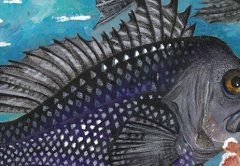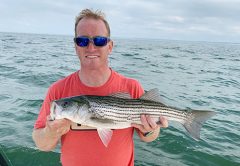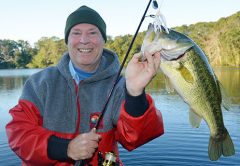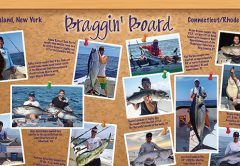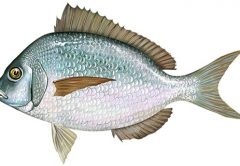One cruel paradox we fish-writers have learned to accept is that, at least here on the New England tundra, fishermen tend to do the bulk of their most focused and sustained annual reading during the stretch of calendar when there are virtually zero fish in our collective fore. Absent the cast of seasonal migrants that occupy the balance of our living hours not chewed up by work or other obligations such as eating, shaving, collecting toenail clippings, and bathing every other week whether we need it or not, we pursue any and all avenues of recreation we think might help ease the intensifying fish withdrawal symptoms. Among other activities, we use our Dark Months free time to catch up on the fishing magazines that drifted like so many four-square-foot, 50-page newsprint snowflakes where wall meets floor tiles in the bathroom from roughly May through the bitter end of November.
So, getting back to this aforementioned paradox, the ugly truth is that, on a national average, the majority of fishing publications treat the winter “off-season”—the time of year when we actually have both time and inclination to read each issue literally cover-to-cover, including, under the right conditions, mailing label and fine-print disclaimer copy in the gutter of the outboard engine promo ad on the back—as the polite time to roll out what is probably their weakest, most tepid content line-up.
Since the earliest days of my own fish-writing career, when I began to edit one of the local weekly fish wrappers, I’ve always wanted to address this age-old dilemma—and not by reporting on current events in Florida angling. Hell, this is a time when we can mull over the big-picture conservation issues. We can run through a hundred carefully-devised theoretical scenarios—case studies—in fishing scenarios we commonly encounter during the Manic Months.
By virtue of having stayed so long in Rhode Island’s fishable waters, I have wound up in a somewhat unique position to access some of the sharpest folks in the racket—to pepper them with questions and ultimately mine their brains for thoughts on the diverse ways they’ve managed, year in and year out, to rack up such impressive scores of good fish across a wide range of fisheries over many years.
With all this in mind, your Fearless Publishers, Mike and Lisa, and I have agreed to continue the weekly internet entries you’ve come to expect every Friday afternoon right through the darkest leg of the Dark Months—the reading months. But, rather than following the model we use for our in-season pre-weekend fishing updates, the plan from roughly December through March or April will be to tackle a different specific topic related to some aspect of Rhode Island’s numerous fish and fisheries in micro detail. The idea is to lay out a question of theoretical fishing scenario of the sort we all confront a hundred times at regular intervals each season, then run that question or case-study by a rotating pool of our sharpest sources, according to individual expertise, for their considered input.
How do you cope with the dreaded no-drift situation in mid-summer fluking? How might a Block Island neophyte with some surf skills most effectively get a handle on the seemingly endless fishable shoreline on a weekend venture? Where—and when—might you begin your search for the first monster threshers or makos of a new season? What does ASMFC need to do to properly address the growing trouble bearing down on our increasingly shaky striped bass resource? How do you catch bigger sea bass when the grounds are just about rotten with six-inchers? Where—how—might one turn up a handful of winter flounder when the spring season opens?
The questions, when I pause for literally 30 seconds to consider the logistics of this new winter undertaking are endless—to the extent that we could probably deo this exercise every week for for ten straight years and never run out of relevant fodder.
The hope on my end is that these weekly entries will help newcomers and veterans alike continue learning the basics or finer points of the sport right through the worst of the annual piscatorial D.T.’s. A huge bonus as we move forward is that regular readers of this fine publication will be able to call these columns back up out of our website archives t the exact points when the various case-studies, inquiries, or technical debates will ultimately be of greatest value—when, that is, the fisheries in question have exploded once again into full bloom, whether it’s on the far end of the looming winter, or in the first half of 2015.
As the 2013 season begins to recede into the watery distance astern, we will try, as we do every other year, to come to terms with the certainty that, with the exception of of the limited fishing options we might peruse to stave off the quivering misery of fishing in the bone-crushing February freeze, we’re just going to have to deal with yet another interminable stretch of New England’s unfishiest weeks and months.
Now that you actually have the time—and before the worst of the holiday mayhem sets in, forcing us all into a consumerist trance of sorts—consider the challenges you faced on the various grounds you fished in 2013. Consider which conservation issues you view as the most urgent. If you have a topic you’d like to throw us a question we could then farm out to the guys in our collective network of local sharpies, by all means take a few minutes to fire off a quick e-mail to zhfished@gmail.com, or paste it up on the wall on our Facebook page. We’ll do our best to hunt down the information you need from the folks most specifically qualified to give it.
[easy-social-share]





